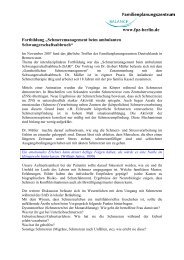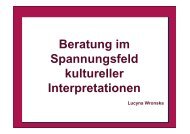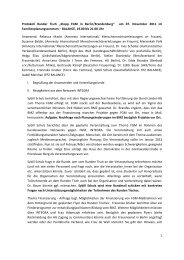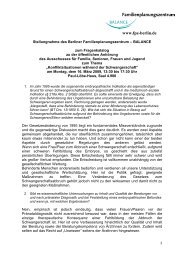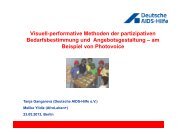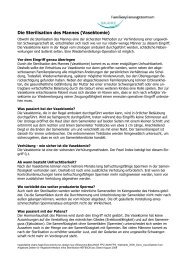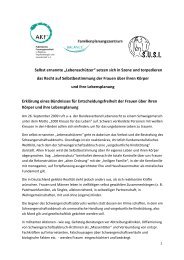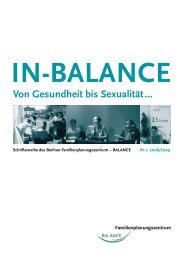3Methods3.1. Stages of study implementationThe research project was implemented in the following threephases/stages:I. Preparation of the field study:• Development of the methodological concept of thestudy and literature review (Feb 2010 - Jun 2010);• Meetings with the Hamburger Behörde für Soziales,Familie, Gesundheit und Verbraucherschutz (BSG)(Department of Social and Family Affairs, Health andConsumer Protection) (March 2010 - June 2010);• Recruitment of interviewers (May <strong>to</strong> August 2010);• Participa<strong>to</strong>ry training and preparation of the datacollection (August 2010);• Development of a <strong>to</strong>olkit (August 2010);II. Implementation of the field study:• Collection of qualitative data (Aug - Sept 2010);• Collection of quantitative data (Sept - Oct 2010)III. Data entry, analysis and report writing(Oc<strong>to</strong>ber - December 2010)The three stages are explained consecutively in the followingparagraphs. Furthermore, ethical considerations (section 3.5)and difficulties and limits of the research (section 3.6) areoutlined.3.2. Preparation of the field study3.2.1. Development of the methodologicalconcept of the studyPlan Germany has funded several projects promoting theabandonment of FGM/C on the <strong>African</strong> continent. Overthe past decade, Plan has become more and more active inadvocating for effective prevention of FGM/C in Germanyand for improving national, regional and global approachesfor the abolition of the practice. An obstacle <strong>to</strong> scalingup programs against FGM/C in Germany (and in Europe)has been the absence of baseline data. Most activities inGermany have been implemented on the basis of anecdotalevidence or on data from Africa which are not necessarilyvalid for communities of the diaspora. To fill this gap,Plan started designing a project <strong>to</strong> establish baseline dataon FGM/C for one pilot city in Germany. The idea was <strong>to</strong>explore how immigrants of different practicing countries perceivethe practice of FGM/C and whether there is evidencethat the practice continues in Germany. The location chosenwas the city of Hamburg. Being one of Germany’s largestcity and a vibrant centre of the country’s economy, Hamburghas become home <strong>to</strong> many migrants from Africa and fromthe West <strong>African</strong> region in particular. It is also the site of PlanGermany’s office, which ensures the presence of the necessarylogistics and contacts <strong>to</strong> facilitate the implementation ofsuch a project. The study concept was revised and fine-tunedwith support of other experts regarding FGM/C in Germany(Terre des Femmes, GTZ, Integra) and an extensive literaturereview was carried out.The research questions <strong>to</strong> be investigated are complex andinclude a wide range of variables. In order <strong>to</strong> create validdata, the methodological approach incorporated the followingcomponents:• It is participa<strong>to</strong>ry, cooperative and engages communitymembers in a joint research process;• It uses a triangulated research design by working withdifferent <strong>to</strong>ols <strong>to</strong> collect qualitative and quantitative datafrom different target groups;• It foregrounds gender and other axes of social differencein the research design, data collection and analysis;• It is innovative and committed <strong>to</strong> co-learning;• It is culture-fair and trans-disciplinary, drawing on resourcesfrom ethnic, developmental, sociological, psychological,critical media literacy and women’s studies.3.2.2. Recruitment of interviewersDiscussing the <strong>to</strong>pic of FGM/C in an interview setting is adelicate matter: the practice is taboo and not easily discussedwith strangers. The ethnic group, age and sex of theinterviewer also play a significant role. People tend <strong>to</strong> givemore details when talking <strong>to</strong> someone of the same sex, whois about the same age and who is familiar with traditionalpractices of the ethnic group. Furthermore, some womenmight still suffer from post-traumatic reactions related <strong>to</strong>their experience of FGM/C. They feel sad or disturbed whenthe <strong>to</strong>pic is raised or make efforts <strong>to</strong> avoid it.Apart from the <strong>to</strong>pic, conducting interviews with <strong>African</strong>immigrants is challenging in itself:• Numerous <strong>African</strong> immigrants are more comfortableexpressing themselves in languages other than German,in particular when it comes <strong>to</strong> sensitive <strong>to</strong>pics. Some immigrantsonly speak local dialects.<strong>Listening</strong> <strong>to</strong> <strong>African</strong> <strong>Voices</strong> 13
• Many of them are struggling <strong>to</strong> legalise their papers andrefuse <strong>to</strong> provide information, fearing that this mightendanger their residence status and infl uence the outcomeof their asylum process.• Some cultures demand that the husband gives his permissionbefore the wife can be interviewed.• Many immigrants have accumulated negative experiencessince their arrival in Germany: the daily encounterswith authorities, the police and their work colleagues aremarked by discrimination or racism. This reduces theirwillingness <strong>to</strong> show high compliance during interviews;Hence, we needed interviewers who have access <strong>to</strong>, areknown by the communities and are considered by most<strong>African</strong> community members as acceptable persons <strong>to</strong> posequestions on this sensitive <strong>to</strong>pic. In order <strong>to</strong> obtain access<strong>to</strong> different communities and <strong>to</strong> both men and women, wemade efforts <strong>to</strong> recruit a team uniting diverse nationalitiesand ethnic backgrounds 2 as well as the same number of menand women of different ages. Further requirements for theinterviewers were:• Integration in one of the <strong>African</strong> communities and <strong>to</strong> havea wide range of contacts with other <strong>African</strong> migrants;• Fluency in either French or English (as spoken in Sub-Saharan Africa);• Fluency in at least one local language;• Motivation and commitment <strong>to</strong> participate in research onFGM/C;• Emotional stability and maturity <strong>to</strong> cope with the psychologicalhardship of conducting interviews on FGM/C;• Intellectual capacity and moral integrity sufficient <strong>to</strong> collecthigh quality data and <strong>to</strong> deal with the research <strong>to</strong>picappropriately;• A German work permit.Plan Germany launched the recruitment process in May 2010by posting an advertisement on the student vacancy page ofthe University of Hamburg. In the following weeks, efforts<strong>to</strong> spread the advertisement were multiplied. Flyers wereposted in Afro Shops and student halls. The call for applicationswas communicated <strong>to</strong> friends and former colleaguesof <strong>African</strong> origin who could further disseminate the callfor applications. Once recruitment interviews had started,candidates were invited <strong>to</strong> forward the advertisement<strong>to</strong> other <strong>African</strong> immigrants. We made special efforts <strong>to</strong>identify potential candidates from high prevalence countries(e. g. Guinea, Ethiopia) or countries with a high number ofmigrants in Hamburg (Ghana, Togo, Nigeria and Egypt). ByAugust, 12 interviewers had been selected, six women andsix men from the following countries of origin: Ghana (2),Togo (1), Cameroon (1), Guinea (1), Gambia (1), Kenya (1),Ethiopia (2), Tanzania (1), Burkina Faso/Senegal (1) and Coted’Ivoire (1). Once the second phase of the data collection,the quantitative survey, had started, another nine interviewersjoined the team. These were six women and three men(from Guinea (1), Nigeria (2), Cote d’Ivoire (1), Ghana (1),Burkina Faso (2), Benin (1) and Togo (1)). Plan Germany didnot receive any applications from candidates of Egyptianorigin. Despite several attempts <strong>to</strong> get access <strong>to</strong> the Egyptiancommunity and identify potential candidates, we were notable <strong>to</strong> recruit any interviewers from this country.3.2.3. Training of interviewers and preparationof the data collectionThe 12 recruited interviewers were invited <strong>to</strong> participate ina 5-day training and preparation week from 16 <strong>to</strong> 20 August2010. The sessions were prepared and facilitated by thereport author. The agenda of the first half of the week aimed<strong>to</strong> encourage the interviewers <strong>to</strong> explore their feelings andperceptions <strong>to</strong>wards the practice and <strong>to</strong> build up their knowledgeof FGM/C. The sessions included contents such as:• the prevalence, geographical spread and different types ofFGM/C,• socio-cultural and religious motives for practicing FGM/C,• medical, sexual and psychological risks and effects associatedwith the practice,• the legislation in <strong>African</strong> and European countries regardingFGM/C as well as• programming strategies <strong>to</strong> eliminate FGM/C in Africa.The sessions of the second half of the week had the objective<strong>to</strong> present, discuss and adapt the research methodology,<strong>to</strong> train and practice interview and question techniques and<strong>to</strong> develop and finalise question lists for the key informantinterviews. The interviewers learnt about and conducted roleplays on how <strong>to</strong> introduce the <strong>to</strong>pic of FGM/C in a sensitivemanner. The importance of keeping a neutral attitude duringthe interview and of using non-suggestive methods of posingquestions was particularly emphasised in order <strong>to</strong> avoidinfl uencing the response pattern of the participants and <strong>to</strong>avoid the creation of socially desired answers. At the end ofthe week, a work plan for the first weeks of data collectionwas jointly drawn up.3.2.4. Description of the research <strong>to</strong>olsThe methodological approach of the project included twodata collection methods: (1) key informant interviews and(2) semi-structured individual interviews with <strong>African</strong> communitymembers.2 Of Sub-Saharan countries practicing FGM/C.14<strong>Listening</strong> <strong>to</strong> <strong>African</strong> <strong>Voices</strong>






